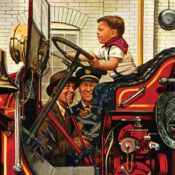1. In a ______ that would follow him to his dying day, Geoffrey greeted the Queen by saying, “It is my majesty, Your Honor.”
- gaff
- gaffe
- guff
2. Which type of protester is likely to be the most disruptive?
- A truculent trucker
- A taciturn attorney
- A tractable actor
3. Sherry prefers daiquiris to margaritas, asiago to mozzarella, tangerines to oranges, and fig newtons to macarons. What’s the key to Sherry’s tastes?
Answers and Explanations
1) b. gaffe
Gaffe with that final e is the word that means “a social or political blunder,” which is certainly what Geoffrey committed when he transposed the words majesty and honor.
The e-less gaff has had a number of meanings over the years, including “a cheap theater,” “a painful ordeal,” and “a deception.” But most use of the word these days comes down to hooks: metal leg spurs used in cockfights, large hooks for moving heavy fish or hanging meat to be butchered, and smaller spikes affixed to boots to aid in climbing are all different types of gaffs.
On a film set, the gaffer is the head electrician, which doesn’t seem to have an obvious connection to hooks. It’s believed, though, that the term came from the name of the person in charge of stage lighting in the early theater. Gaffers would use a gaff — a long rod with a hook on the end — to adjust overhead lights.
Guff is a completely unrelated word that simply means “nonsense,” as in, “Don’t give me any guff!”
2) a. A truculent trucker
The three words truculent, taciturn, and tractable are by no means obscure, but neither are they common.
Truculent, the correct answer, derives from a Latin word that means “savage,” and that is more or less what the word means today — though it has lost some of its fierceness. A truculent person is easy to anger and likely to argue.
Taciturn, a synonym of reticent, means “inclined to silence” — the very opposite of disruptive. You might recognize the related word tacit in there, which usually describes a type of communication without the use of words or speech, as in giving tacit consent. A taciturn attorney might be effective for creating and interpreting complex paperwork but would likely underperform in a courtroom setting.
Tractable isn’t related to tractor but is a relative of treatise. From the Latin tractare “to handle, treat,” tractable means “malleable or easily controlled.” Far from being disruptive, a tractable actor would be easy to direct.
3) Sherry likes foods that are named after places.
- The daiquiri is named after the rum-producing Cuban district of Daiquirí, whereas margaritas are named after a woman.
- Many (I daresay most) cheeses are named after the regions where they were developed, including asiago, which is a town in Italy. You’ve also probably tasted cheeses from Cheddar, England; the Gruyère district of Switzerland; Gouda, Netherlands; France’s Brie district; and Limburg, Belgium. Mozzarella, on the other hand, is from an Italian word that means “to cut off” and is etymologically related to the word mutilate.
- The mandarin oranges we call tangerines got their name from the Moroccan city of Tangier (through its French spelling, Tanger), while the word orange traces its roots to Sanskrit.
- As many people learned in the early seasons of The Big Bang Theory, fig newtons are named after the town of Newton, Massachusetts. The word macarons — describing a type of French sandwich cookie — is etymologically related to the Italian macaroni, “a stuffed pasta.”
Become a Saturday Evening Post member and enjoy unlimited access. Subscribe now




Comments
Merci, M. Mulvaney. Je l’ai réparé.
Vous avez made a gaffe wiz the accent in Gruyere. It should be a GRAVE, not an AIGU…